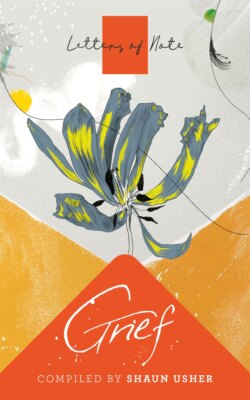Читать книгу Letters of Note: Grief - Группа авторов - Страница 14
На сайте Литреса книга снята с продажи.
ОглавлениеLETTER 04
I HAVE FELT THIS LOSS WITH ALL MY HEART
Johann Wolfgang von Goethe to Anna Margaretha Textor
February 1771
In 1768, seventy-four-year-old lawyer and then mayor of Frankfurt Johann Wolfgang Textor suffered a stroke from which he would never truly recover. His efforts to continue working proved futile and a year later he withdrew from public office. In February of 1771, he died, leaving behind his wife, Anna, and five children. Shortly after Textor’s death, his widow received this letter from one of their grandsons, Johann Wolfgang von Goethe. This was written three years before publication of Goethe’s wildly successful debut novel, Die Leiden des jungen Werther (The Sorrows of Young Werther), which instantly set him on the path to becoming one of the most important figures in the history of literature.
THE LETTER
Strasbourg
February 1771
Dearest Grandmama,
The death of our dear father, already dreaded from day to day for so long a time, has yet come upon me unprepared. I have felt this loss with all my heart; and what to us is the world around us, when we lose what we love?
To console myself, and not you, I write to you, you who are now the head of our family to beg you for your love, and assure you of my tenderest devotion. You have lived longer in the world than I, and must find in your own heart more comfort than I know of. You have endured more misfortune than I; you must feel far more vividly than I can say it that the most sorrowful occurrence often, through the hand of Providence, takes the most favorable turn for our happiness; that the succession of fortune and misfortune in life is intertwined like sleep and waking, neither without the other, and one for the sake of the other; that all happiness in the world is only lent.
You have seen children and grandchildren die before you, ceasing their work in the morning of their life; and now your tears accompany a husband to the everlasting Sabbath rest – a man who has honestly earned his wage. He has it now; and yet the good God, whilst he took thought for him has also taken thought for you – for us. He has taken from us not the merry friendly, happy old man who carried on the affairs of the age with the vivacity of a youth, who stood out amongst his fellow-citizens and was the joy of his family. He has now taken from us a man whose life we have seen for some years hanging by a silken thread. His energetic spirit must have felt with painful heaviness the oppressive weight of his sickly body; must have wished himself free, as a prisoner yearns to escape from his cell.
Now he is free, and our tears bid him
God-speed; and our sorrow gathers us around you, dear Mama, to console ourselves with you, hearts simply full of love. You have lost much, but much remains to you. Look at us, love us, and be happy. May you enjoy for a long time yet the temporal reward which you have so richly earned of our invalid father, who has gone hence to report it at the place of requital and who has left us behind as tokens of his love, tokens of the past time of sorrowful yet pleasing recollection.
And so may your love for us remain as it was; and where much love is, there is much happiness.
I am, with a truly warm heart, your loving grandchild,
J. W. Goethe
